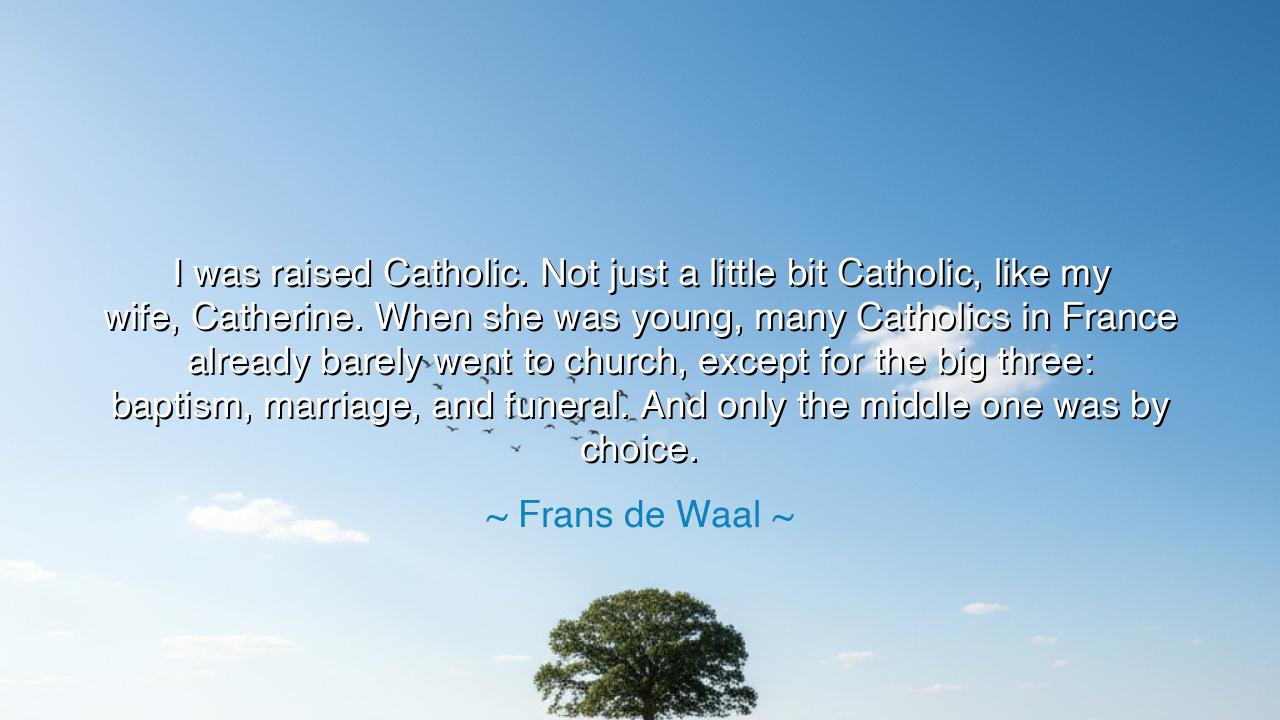
I was raised Catholic. Not just a little bit Catholic, like my
I was raised Catholic. Not just a little bit Catholic, like my wife, Catherine. When she was young, many Catholics in France already barely went to church, except for the big three: baptism, marriage, and funeral. And only the middle one was by choice.






In the words of Frans de Waal, “I was raised Catholic. Not just a little bit Catholic, like my wife, Catherine. When she was young, many Catholics in France already barely went to church, except for the big three: baptism, marriage, and funeral. And only the middle one was by choice.” These words, though spoken with a touch of humor, are laden with deep meaning. They point to the decline of devotion, the changing rhythms of faith in modern society, and the way rituals endure even when belief fades. De Waal contrasts his own upbringing, steeped in Catholic tradition, with that of his wife, whose culture treated religion more as a formality than as a living, daily guide.
The ancients would have recognized this tension between living faith and hollow ritual. Every civilization has known times when worship was burning with spirit, and other times when ceremonies remained but the heart of devotion was gone. In Rome, the gods were honored with festivals and sacrifices, yet the philosopher Cicero lamented that many went through the motions without belief. De Waal’s words echo this ancient struggle: the difference between a people who live their religion deeply, and those for whom religion has become tradition without passion.
His mention of the “big three” sacraments—baptism, marriage, and funeral—reminds us of how faith clings most tightly to life’s milestones. Even when daily devotion wanes, people still seek the sacred at birth, at union, and at death. For in these moments, the human heart is vulnerable: when life begins, we crave blessing; when two souls unite, we crave sanctification; when death comes, we crave comfort. Yet as de Waal notes, of these three, only marriage is chosen freely by the individual. The others arrive unbidden—one at the entrance to life, the other at its end. Thus, in his words lies both irony and truth: faith may be abandoned, but ritual remains, because humanity itself longs for meaning in its most fragile moments.
History itself mirrors this truth. In post-revolutionary France, many cast aside the church, rejecting its authority after centuries of control. Yet even then, the funeral bell still rang, and families still brought infants to the font, if only for tradition’s sake. Faith ebbed, but ritual survived. Similarly, in ancient Egypt, even skeptics of the afterlife still buried their loved ones with tokens and prayers, unwilling to let go of custom at life’s edge. De Waal’s observation is not merely about Catholicism, but about humanity’s universal pattern: when belief grows faint, ritual endures as a thread of continuity.
But there is also a warning in his words. To let faith dwindle to only its ceremonies is to risk emptying the vessel of its spirit. Ritual without meaning becomes habit without power. The ancients called this hypocrisy—offering sacrifices to the gods with lips while the heart was elsewhere. De Waal, in his gentle way, points out how in France, religion for many had already withered into formality: three events that mark existence, rather than a living presence shaping daily life.
The lesson for us is clear: we must ask ourselves whether we live with conviction or merely follow tradition. To honor the sacred at baptism, marriage, and funeral is good, but what of the days in between? Do we seek meaning only at the milestones, or do we walk with it in the ordinary hours? A society that remembers the rituals but forgets the faith risks becoming hollow, like a tree with roots cut away yet still standing—until the storm comes.
Practical actions follow from this wisdom. Examine your own rituals—do they hold meaning, or are they performed out of habit? Seek the sacred in daily life, not just at its great turning points. Honor tradition with understanding, not as empty ceremony but as a vessel carrying the wisdom of generations. And above all, choose your path with awareness, for unlike baptism and funerals, the faith you live each day is by choice, as surely as marriage is.
Thus, Frans de Waal’s words, though light in tone, echo with timeless weight. They remind us that while religion may fade in culture, its rituals cling to the human soul. Let us not allow them to stand empty, but fill them with meaning, so that life in all its stages is lived not only with tradition, but with truth, not only with form, but with faith.






AAdministratorAdministrator
Welcome, honored guests. Please leave a comment, we will respond soon